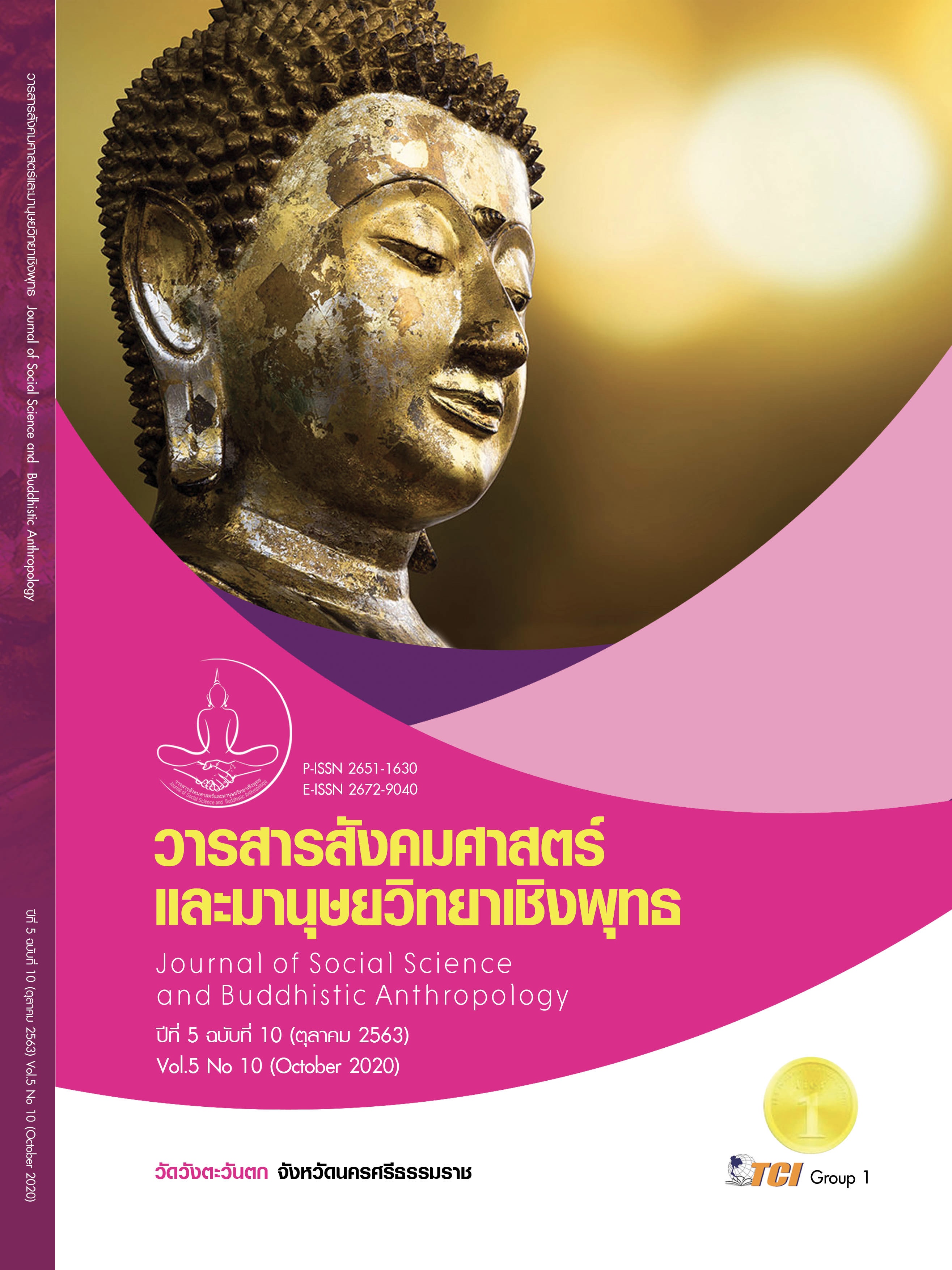CURRICULUM DEVELOPMENT EMPHASIZING WITH LEARNING DESIGN AS STEAM EDUCATION BASED ON LOCAL WISDOM FOR STUDENT TEACHERS
Keywords:
Curriculum Development, Learning Design, STEAM Education, Local wisdomAbstract
The Objectives of this article were to develop a curriculum emphasizing learning design as STEAM Education based on local wisdom for student teachers had an effectiveness than the set benchmark of 75/75 and to study the effectiveness of the curriculum .The research was conducted in two cycles. The first cycle was conducted with a pilot group of students in the Bachelor of Education program in the second semester of the 2018 academic year. The second cycle in this research consisted of 25 fourth-year students in the Bachelor of Education program at Suratthani Rajabhat University, using extract cluster sampling in the first semester of the 2019 academic year.The data were analyzed with a one sample t-test and the Repeated-Measure ANOVA. The results of the study on the effectiveness of the curriculum used information from the following : 1) The curriculum emphasizing learning design as STEAM education based on local wisdom for student teachers found that the curriculum had an effectiveness of 80/86.92 which was higher than the set benchmark of 75/75. 2) The effectiveness of the curriculum were as follows the comparison after the experiment between the mean of ability learning design in STEAM Education based on the local wisdom and the innovative skills of student teachers and a 75% standard criterion was different at a statistically significant level and each student teacher compared the different levels of awareness based on local wisdom. in the period before the study, during the study and after study, it was found that there were different levels of awareness based on local wisdom, with at least one pair with statistical significance. (F = 178.49, df = 2, p < .001)
References
ข้อบังคับคุรุสภา. (2562). ราชกิจจานุเบกษา เล่ม 136 ตอนที่ 68 ง หน้า 18 (20 มีนาคม 2562) .
ชลธิชา ชิวปรีชา. (2554). การคิดสร้างสรรค์ของเด็กปฐมวัยที่ทำกิจกรรมศิลปะด้วยใบตอง. ใน วิทยานิพนธ์การศึกษามหาบัณฑิต สาขาการศึกษาปฐมวัย. มหาวิทยาลัยศรีนครินทรวิโรฒ.
นฤมล ไกรฤกษ์. (2558). การพัฒนาความคิดสร้างสรรค์ของเด็กปฐมวัยปีที่ 2 โดยใช้กิจกรรมศิลปะต่างรูปแบบโรงเรียนวัดดุสิตาราม. ใน วิทยานิพนธ์ครุศาสตรมหาบัณฑิต สาขาวิชาหลักสูตรและการสอน. มหาวิทยาลัยราชภัฎธนบุรี.
ประสาท อิศรปรีดา. (2532). จิตวิทยาการเรียนรู้กับการสอน. กรุงเทพมหานคร: นําอักษรการพิมพ์.
วิชัย วงษ์ใหญ่ และมารุต พัฒนผล. (2558). กระบวนทัศน์การโค้ชเพื่อเสริมสร้างทักษะการสร้างสรรค์และนวัตกรรม. (พิมพ์ครั้งที่ 1). กรุงเทพมหานคร: บริษัทสนิทวงศ์การพิมพ์ จำกัด.
วีระพงษ์ แสง - ชูโต. (2558). ปรัชญาวิทยาศาสตร์ในภูมิปัญญาท้องถิ่น. เชียงใหม่: ภิรมย์กิจการพิมพ์.
สมหวัง มหาวัง. (2554). การพัฒนาหลักสูตรฝึกอบรมเพื่อเสริมสร้างการพัฒนาสมรรถนะครูด้านการบูรณาการภูมิปัญญาท้องถิ่นในหลักสูตรสถานศึกษาขั้นพื้นฐาน. ใน ดุษฎีนิพนธ์การศึกษาดุษฎีบัณฑิต สาขาการบริหารและพัฒนาการศึกษา. มหาวิทยาลัยมหาสารคาม.
สำนักงานวัฒนธรรมจังหวัดสุราษฎร์ธานี. (2561). องค์ความรู้ทางวัฒนธรรม. เรียกใช้เมื่อ 20 เมษายน 2563 จาก https://www.m-culture.go.th/suratthani/main. php?filename=index#article
อภิสิทธ์ ธงไทย. (2558). สะเต็มศึกษา. เรียกใช้เมื่อ 13 ธัยวาคม 2560 จาก www.knw.ac.th/UserFiles/files/STEM.
อุทัยทิพย์ เจี่ยวิวรรธน์กุล. (2559). การถอดบทเรียน. เรียกใช้เมื่อ 3 ตุลาคม 2558 จาก http://ibc.rid.go.th/cbi/learn1.html
Chantrasa, R. et al. (2016). Integration of value engineering and theory of inventive problem solving (TRIZ) for increasing the value of industrial products: case study of air-conditioner. KKU Engineering Journal, 43(S2), 254-258.
Dewey, J. (1952). The Educatinal Theory of John Dewey (1859-1952). Retrieved August 11, 2019, from http://www.newfoundations.com/GALLERY /Dewey.html
IMD World Competitiveness Yearbook. (2020). International Institute for Management Development. Retrieved
April 1, 2020, from https://www.etda.or.th/content/world-economic-forumranking2019.html
James, W. (1910). American Philosopher. Retrieved August 11, 2019, from http://www.trincoll.edu/depts/phil/philo/phils/wjames/html
Joyce, B. et al. (1984). Model of Teaching. (4th ed). Massachusetts: Allyn and Bacon.
Kim, Y. & Park, N. (2012). Development and Application of STEAM Teaching Model Based on the Rube Gddbery’s Invention. Retrieved August 12 , 2019, from https://www.scribd.com/document/160508224/2012-Kim-Y-Development-and-Application-of-STEAM-Teaching-Model-Based-on-the-Rube-Goldberg-s-Invention
Kwon, H. (2011). Research Trends on the Integrative Efforts in Technology Education: Reviews of the Relevant Journals. Secondary Education Research, 57(1), 245-274.
LUO Lingling et al. (2017). A Comparative Study on the Teaching Effects of TRIZ Courses for the Humanities. Asian Journal of Education and Training, 3(1), 25-29.
Pavel Livotov. (2008). TRIZ and Innovation Management. Retrieved May 11, 2020, from https://www.researchgate.net/publication/242219907_TRIZ_and_Innovation Management
Thorndike, E. L. (1911). Animal intelligence: Experimental studies. New York: Macmillan.
Vennix, J. et al. (2018). o outreach activities in secondary STEM education motivate students and improve their attitudes towards STEM? International Journal of Science Education, 40(11), 1263-1283.
Vocational, W. & College, T. (2005). The Reconstruction of Practice Instruction System Based on TRIZ. Retrieved August 12, 2019, from https://pdfs.semanticscholar.org/cbcb/1800ef9c109b0530783829c85acc2541306d.pdf?_ga=2.235020929.1245275439.1596793104-1599075641. 1596793104
Yakman, Georgette George. (2008). STEAM Education: an overview of creating a model of integrative Education. Retrieved August 11, 2019, from http://www. iteaconnect.org/Conference/PATT/PATT19/Yakmanfinal 19.pd









